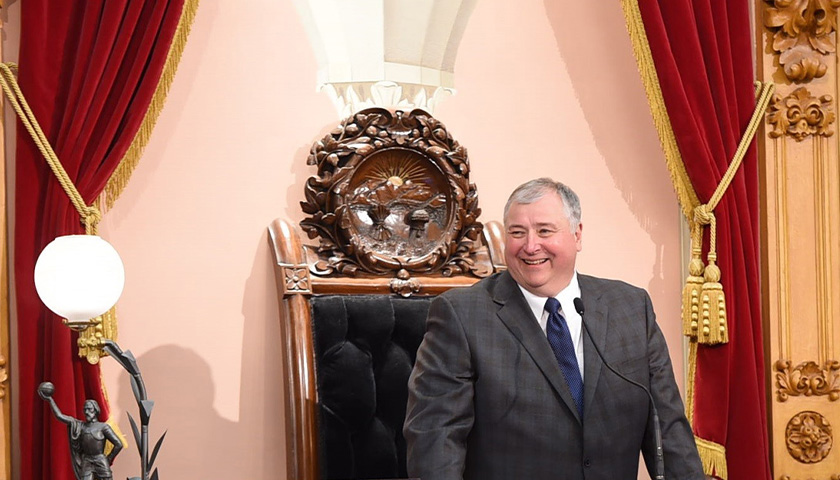by J.D. Davidson
The Ohio House’s first bipartisan public move to try to expel indicted former Speaker of the House Larry Householder highlighted the divide among Republicans after Householder’s reelection following federal charges of racketeering, bribery and money laundering.
House Resolution 69 received its first hearing in front of the House Rules and Reference Committee, which is chaired by current House Speaker Bob Cupp, R-Lima. Cupp consistently has said Householder, R-Glendale, should resign.
“Representative Householder is under indictment for selling legislation, and Ohioans cannot fathom how he remains in a position to continue to introduce legislation under those circumstances,” Rep. Brian Stewart, R-Ashville, testified Thursday. “Virtually everyone associated with this scandal lost their jobs a long time ago. The only person who has not lost their job is the only person indicted for being the mastermind of the whole scandal.”
Republicans are split between wanting Householder removed and allowing the legal process to run its course. Householder would be removed from office if convicted. State law bars anyone who is a convicted felon or has been convicted of bribery to hold public office.
The Ohio Constitution allows for the House to remove a member for disorderly conduct but fails to provide a definition or lay out specific examples. Sponsors argue the House can decide on a definition and the charges against Householder, along with other guilty pleas associated with the case, easily rise to the level of disorderly conduct.
Rep. Bill Seitz, R-Cincinnati, compared that thought with similar ones advanced by U.S. House Democrats during impeachment proceedings involving former President Donald Trump.
“It surprises me as conservative Republicans you would be making that argument,” Seitz said.
Stewart said he has heard the argument and the resolution’s charges are not another witch hunt and each member can decide their own definition of disorderly conduct.
“We certainly believe selling legislation rises to disorderly conduct,” Stewart said. “These charges were not brought by Adam Schiff and Jerry Nadler. These charges were brought by Donald Trump’s hand-picked U.S. attorney. This is law enforcement. If this is not disorderly conduct, I would struggle to define what is.”
Householder gets his opportunity Tuesday to answer the resolution. Cupp invited him to testify in person or provide a written statement at the committee’s next hearing.
Householder, along with four co-conspirators, were charged 11 months ago in what federal prosecutors called the largest political corruption case in state history. Three of the six entities charged have pleaded guilty. Householder has pleaded not guilty.
Also charged were former Ohio Republican Party Chairman Matt Borges, lobbyist Neil Clark, the Oxley Group co-founder Juan Cespedes and strategist John Longstreth.
According to a news release from the U.S. attorney’s office, the conspiracy involves more than $60 million paid to a 501(c)(4) entity to pass and uphold a billion-dollar nuclear plant bailout.
The charging documents said the group conspired to launder millions of dollars in bribes through the entity Generation Now. Court documents show the enterprise received millions of dollars in exchange for Householder and the group’s help in passing House Bill 6, which saved two Ohio nuclear power plants from closing.
Longstreth admitted in his plea to organizing Generation Now for Householder, knowing it would be used to receive bribe money to further Householder’s bid for speaker of the House. Longstreth managed Generation Now bank accounts, and he said he concealed the energy company was the source of the funding.
Cespedes admitted he orchestrated payments to Generation Now, and he knew the payments were meant to help Householder politically in return for help in passing HB 6.
HB 6 created a new Ohio Clean Air Program to support nuclear energy plants and some solar power facilities. Electricity consumers were to fund the program with the surcharge that ran through 2027.
The fee, which was scheduled to begin Jan. 1, was stopped by the Ohio Supreme Court in late December. Ohio Attorney General Dave Yost also reached a deal with FirstEnergy to stop what would have been a $120 million windfall for the company this year based on another part of HB 6.
– – –
An Ohio native, J.D. Davidson is a veteran journalist with more than 30 years of experience in newspapers in Ohio, Georgia, Alabama and Texas. He has served as a reporter, editor, managing editor and publisher. He is regional editor for The Center Square.
Photo “Larry Householder” by The Ohio House of Representatives.








